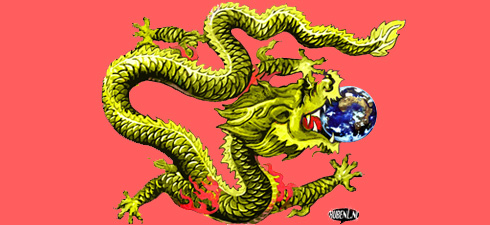I don't know what you think, but, as far as I'm concerned, I have no desire to die Chinese. Yet, the way things are going, it is highly probable that I will.
In mid-September, just at the time when Southern Europe was rushing towards disaster, during the Annual Congress of the World Economic Forum, which, since 2007 is held (is this a coincidence?) in China, and which is, this year, titled "New Champions 2011," prime minister Wen Jiabao announced that his country would invest more and more in the "old" continent.
Are the Chinese going to save us or invade us?
With a terrifying sense of timing, some insistent voices were heard in the preceding days concerning Chinese intentions in making massive investments in Italian Treasury Bonds, as corroborated by the trip to Rome by the president of the China Investment Corp, one of the world's wealthiest investment funds. He came to discuss the purchase of a consistent packet of shares in businesses strategic to our national economy. Since then, not a day has passed without us asking ourselves if the Chinese are coming to save us or to invade us.
In my own case, the question is all the more worrisome, because, as chance would have it, my most recent novel La seconda mezzanotte [Not translated into English] came out totally by chance on September 14, the very day press agencies were heralding the words of Wen Jiabao.
In the book, I imagined that in 2092, Italy would become a satellite state of China after having ceded its entire external debt and that Venice, following a terrible flood, was bought by a Beijing-based transnational company. Recast with the statute of Politically Autonomous Zone, its new destiny would be to become a theme park dedicated to luxury and the rampant vices of nouveaux riches from the East.
Clash of civilisations between Europe and China
Literary catastrophes aside, it seems clear that the arrival of Chinese political and financial sovereignty on our old continent would precipitate the decline of European civilisation as we have known, dreamed and loved it (even if only in our idyllic visions). I fear that this is a serious threat for the cultural foundations of modern Western European civilisation including: the people's political sovereignty; freedom of thought and of expression; labour and citizens' rights; personal autonomy; solidarity towards others in the society; personal worth; food safety and the respect for the sanctity of life.
Yes, I fear all this not only because I can still see in my mind's eye the young man who, in Tiananmen Square, confronted a tank armed only with two grocery-filled bags (don't forget the man was also Chinese), or because I foresee a conflict of civilisations between Europe and China, but because I am frightened by the drift of a financial capitalism in which Chinese sovereign funds today represent the spearhead and by the use made of capitalism which was conceived to finance labour and business but which has succeeded in burying both.
If in the near future politics isn't capable of retracing its steps on the path that led from sovereignty to obscenity, there is in fact a risk that, in a not-so-distant future, a gigantic conflict will erupt between the speculative interests of stateless financial entities – whether they be Chinese, US or home-grown is of no import – and the needs, legitimate aspirations and hopes of each of us.
View from China
Italy will end, like Sparta, as a theme park
The fears expressed by Antonio Scurati in one of his novels seem to have been heard in China. In the debt-ridden countries of southern Europe, writes Hong Kong-based web site Asia Times, "As the descendants of the former masters of the Mediterranean fade into senescence, hordes of Asian tourists will keep them in business. That's the Spartan model." The Times compares the Greek city to Italy - "Sparta is the first world power to succumb to demographic suicide, and also the first former power to live on as a theme park. [...] The last remaining Spartans continued to oil their hair, don their red robes, play their flutes and train in a phalanx for gawking Roman visitors until the end of the 2nd century CE". The Times adds that "If Italian tourists kept Sparta afloat half a millennium after its political model passed its best-used-by-date, Chinese tourists well might sustain Italy for another century or two". It also foresees that "Under the right circumstances, Asians could double that number in a few years, helping Italy to service its US$2.2 trillion external debt. But there's a catch: China would have to own a good deal of the country".
Was this article useful? If so we are delighted!
It is freely available because we believe that the right to free and independent information is essential for democracy. But this right is not guaranteed forever, and independence comes at a cost. We need your support in order to continue publishing independent, multilingual news for all Europeans.
Discover our subscription offers and their exclusive benefits and become a member of our community now!












